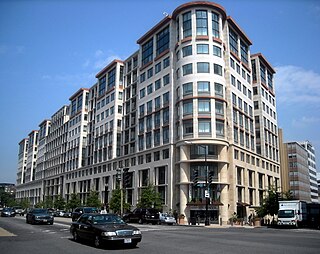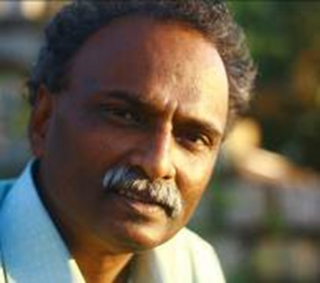
The United Nations Economic and Social Council is one of the six principal organs of the United Nations, responsible for coordinating the economic and social fields of the organization, specifically in regards to the 15 specialised agencies, the eight functional commissions and the five regional commissions under its jurisdiction.

The International Finance Corporation (IFC) is an international financial institution that offers investment, advisory, and asset-management services to encourage private-sector development in less developed countries. The IFC is a member of the World Bank Group and is headquartered in Washington, D.C. in the United States.
The green economy is defined as economy that aims at making issues of reducing environmental risks and ecological scarcities, and that aims for sustainable development without degrading the environment. It is closely related with ecological economics, but has a more politically applied focus. The 2011 UNEP Green Economy Report argues "that to be green, an economy must not only be efficient, but also fair. Fairness implies recognizing global and country level equity dimensions, particularly in assuring a just transition to an economy that is low-carbon, resource efficient, and socially inclusive."

Green building refers to both a structure and the application of processes that are environmentally responsible and resource-efficient throughout a building's life-cycle: from planning to design, construction, operation, maintenance, renovation, and demolition. This requires close cooperation of the contractor, the architects, the engineers, and the client at all project stages. The Green Building practice expands and complements the classical building design concerns of economy, utility, durability, and comfort.. In doing so, the three dimensions of sustainability, i.e., planet, people and profit across the entire supply chain need to be considered.

World Oceans Day takes place annually on the 8th of June. The concept was originally proposed in 1992 by Canada's International Centre for Ocean Development (ICOD) and the Ocean Institute of Canada (OIC) at the Earth Summit – UN Conference on Environment and Development (UNCED) in Rio de Janeiro, Brazil. World Oceans Day was officially recognised by the United Nations in 2008. The International day supports the implementation of worldwide Sustainability Development Goals, and fosters public interest in the management of the ocean and its resources.

The U.S. Green Building Council (USGBC), co-founded by Mike Italiano, David Gottfried and Rick Fedrizzi in 1993, is a private 501(c)3, membership-based non-profit organization that promotes sustainability in building design, construction, and operation. USGBC is best known for its development of the Leadership in Energy and Environmental Design (LEED) green building rating systems and its annual Greenbuild International Conference and Expo, the world’s largest conference and expo dedicated to green building. USGBC was one of eight national councils that helped found the World Green Building Council (WorldGBC). The current president and CEO is Mahesh Ramanujam who acquired this role in January 2017 after co-founder Rick Fedrizzi.

The Canada Green Building Council (CaGBC) was created in 2003 to further the expansion of green building in Canada. Prior to the formation of the Council, Canada had participated in the United States Green Building Council (USGBC) through British Columbia's membership in the USGBC's Cascadia Chapter.

The Quaker Council for European Affairs (QCEA) is an international not-for-profit organisation which seeks to promote the values and political concerns of the Religious Society of Friends (Quakers) at the European level. It undertakes research and advocacy in the fields of peacebuilding and human rights policy, notably in relation to the European Union and the Council of Europe. Founded in 1979 by Quakers who worked in the European institutions, it is based in Brussels, Belgium and is registered under Belgian law.
The Haute Qualité Environnementale or HQE is a standard for green building in France, based on the principles of sustainable development first set out at the 1992 Earth Summit. The standard is controlled by the Paris-based Association pour la Haute Qualité Environnementale (ASSOHQE).

BESIX Group is a construction group based in Brussels, one of the world's leading international contractors according to the ENR ranking. Active since 1909, BESIX operates in Europe, the Middle East, Oceania, Africa, North America and Asia.
A green building is one which uses less water, optimises energy efficiency, conserves natural resources, generates less waste and provides healthier spaces for occupants, as compared to a conventional building. The Indian Green Building Council (IGBC) is the leading green building movement in the country.

The Philippine Green Building Council (PHILGBC) is a national non-stock, non-profit organization that promotes the sharing of knowledge on green practices to the property industry to ensure a sustainable environment. It was organized to serve as a single voice in the promotion of holistic and market-based green building practices, to facilitate the sharing of green building information and practices in the building industry, and to serve as a non-partisan venue for the development of the BERDE Green Building Rating System.
LEED for Neighborhood Development (LEED-ND), where "LEED" stands for Leadership in Energy and Environmental Design, is a United States-based rating system that integrates the principles of smart growth, urbanism, and green building into a national system for neighborhood design. LEED certification provides independent, third-party verification that a development's location and design meet accepted high levels of environmentally responsible, sustainable development.
Sustainability standards and certifications are voluntary, usually third party-assessed, norms and standards relating to environmental such as IFGICT Standard, social, ethical and food safety issues, adopted by companies to demonstrate the performance of their organizations or products in specific areas. There are over 400 such standards across the world. The trend started in the late 1980s and 90s with the introduction of Ecolabels and standards for Organic food and other products. Most standards refer to the triple bottom line of environmental quality, social equity, and economic prosperity. A standard is normally developed by a broad range of stakeholders and experts in a particular sector and includes a set of practices or criteria for how a crop should be sustainably grown or a resource should be ethically harvested. This might cover, for instance, responsible fishing practices that don't endanger marine biodiversity, or respect for human rights and the payment of fair wages on a coffee or tea plantation. Normally sustainability standards are accompanied by a verification process - often referred to as "certification" - to evaluate that an enterprise complies with a standard, as well as a traceability process for certified products to be sold along the supply chain, often resulting in a consumer-facing label. Certification programmes also focus on capacity building and working with partners and other organisations to support smallholders or disadvantaged producers to make the social and environmental improvements needed to meet the standard.
The UNESCO stated “education for sustainable development is a broad task that calls for the full involvement of multiple educational organizations and groups in bureaucracies and civil societies. These include Non-Governmental Organizations or NGOs.
Sustainable products are those products that provide environmental, social and economic benefits while protecting public health and environment over their whole life cycle, from the extraction of raw materials until the final disposal.
The World Green Building Council (WorldGBC) is a non-profit organisation and global network of national Green Building Councils (GBCs). It has member councils in over 70 countries worldwide, which collectively have 49,000 members.
New Ventures is a global program that provides services for the development of small and medium enterprises (SMEs) whose main goal is to generate a positive environmental or social change within their own communities.

Hariharan Chandrashekar is an Indian economist who turned to business in the late 1980s. He has presided over projects on water, energy and green buildings for over 25 years.

Prem Jain was an Indian green visionary, also known as the Father of Green Buildings in India. Jain served as the chairman of Indian Green Building Council (IGBC).











